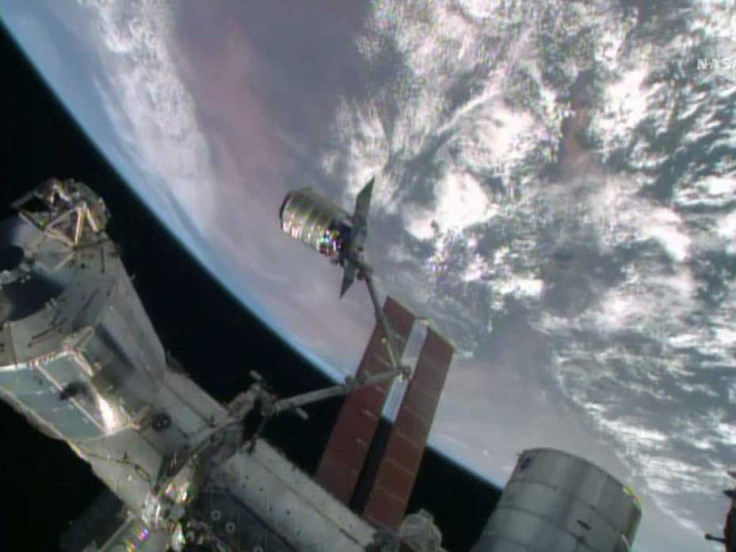SpaceX Astronauts Will Almost Certainly Beat Boeing To ISS

Boeing (NYSE:BA) is losing the space race. And worse than that, more-than-a-century-old Boeing is losing it to a company that didn't even exist until a couple of decades ago.
Last month, Reuters cited "industry sources" warning that Boeing will need to postpone the first unmanned test launch of its CST-100 Starliner crew capsule, the spaceship Boeing bid to win a $4.2 billion NASA contract to run six loads of astronauts to the International Space Station over a period of years.
As recently as last month, Boeing was hoping to get the Starliner launched on its first test flight by April. April's half over, however, and it seems that delays in production, coupled with NASA concerns about Starliner's safety and scheduling conflicts with other launches, have forced Boeing to postpone its maiden voyage until at least August. Because this uncrewed mission must precede any attempt to use the Starliner with humans aboard, this means that the Starliner won't be ready to begin crewed missions before November.
In contrast, Boeing rival SpaceX conducted the first uncrewed mission of its Crew Dragon spacecraft in March -- a resounding success -- and is on track to begin sending crewed missions to ISS as early as July. That means that, as things stand today, SpaceX could send a Crew Dragon full of astronauts to ISS before Boeing even launches its first empty Starliner.
Now, launch delays and postponements happen more often than not in the space business, and it's still possible SpaceX's second Crew Dragon launch date will slip -- just as it's possible Starliner's first flight may get pushed again. But for now the advantage belongs to SpaceX.
Despite being paid 38% less than Boeing to do the same work (i.e., build a human-rated space capsule and run it six times between Earth and ISS), SpaceX has the pole position in this race, and seems destined to beat Boeing's pricier Starliner to its destination.
So what does this mean for investors, and in particular investors in Boeing?
What it means to investors
You may be surprised to hear this, but in the near term at least -- it doesn't mean much. Boeing's Defense, Space & Security business, which accounts for nearly a quarter of the company's revenues, really shouldn't suffer much from Boeing's launch delay.
Why not? The fact that NASA willingly awarded Boeing a commercial crew contract at a price so much higher than SpaceX's bid strongly suggests that NASA wants to keep at least two companies in this race, bidding against each other and forcing each others' prices down.
Indeed, in a recent column, Ars Technica got at least two knowledgeable parties on record confirming this, quoting an unnamed government source saying: "We were fighting to keep two providers," and noting that SpaceX COO Gwynne Shotwell wishes she "would have bid more" -- but was afraid that if she bid too high, SpaceX might have lost the contract. It stands to reason, then, that if NASA was willing to overpay Boeing by $1.6 billion once, it may also be willing to continue paying Boeing a premium in order to keep a lid on SpaceX's prices.
And in light of this strong motivation to keep two horses in the race, I'd expect NASA will be similarly willing to overlook Boeing's delayed arrival to ISS, and not use tardiness as an excuse to deny the company commercial crew contracts in the future.
What it means to taxpayers
That being said, there's one final factor in all of the above that bears examination, and this one's important to you and me as taxpayers. Crunching the numbers on the value of the awards NASA issued to Boeing and SpaceX earlier, Ars concluded that if both their spacecraft prove capable of manned spaceflight, both Boeing and SpaceX will save taxpayers money -- even if Boeing saves us a bit less money than SpaceX.
You see, up until now NASA has been buying space for its astronauts on Russian Soyuz spacecraft whenever they needed to travel to or from ISS, at anywhere from $75 million to $82 million per seat. But the $6.8 billion awarded to Boeing and SpaceX to conduct a total of 12 crew missions to ISS (with four astronauts per mission) is going to cost an average of only $58 million per seat. Across the length of the contract, that's a total savings of $1.15 billion.
ranted, breaking down the numbers even further, Ars calculates that the average "seat cost" of a SpaceX Crew Dragon mission will be $44.4 million, while Boeing's spacecraft will cost $71.6 million per seat. But in order to ensure it continues offering NASA its best price, NASA's probably going to have to keep Boeing in this race to ensure price competition.
Just because Boeing is losing the race to ISS doesn't mean it's necessarily going to lose out on the profits.
This article originally appeared in the Motley Fool.
Rich Smith has no position in any of the stocks mentioned. The Motley Fool has no position in any of the stocks mentioned. The Motley Fool has a disclosure policy





















